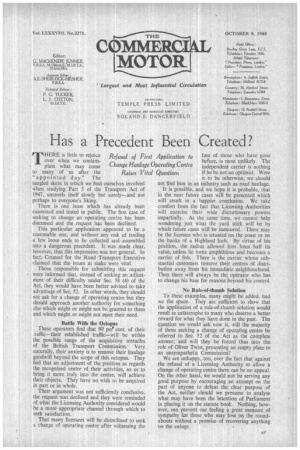Has a Precedent Been 'Created?
Page 41

If you've noticed an error in this article please click here to report it so we can fix it.
Refusal of First Application to Change Haulage Operating Centre Raises Vital Questions
THERE is little to rejoice over when we contemplate what may come to many of us after the "appointed day." The tangled skein in which we find ourselves involved when studying Part 3 of the Transport Act of 1947, unravels itself slowly but surely—and not perhaps to everyone's liking.
There is one issue which has already been examined and tested in public. The first case of seeking to change an operating centre has been discussed and the request has been declined.
This particular application appeared to be a reasonable one, and without any risk of trailing a few loose ends to be collected and assembled into a dangerous precedent. It was made clear, however, that this impression was not general. In fact, Counsel for the Road Transport Executive claimed that the issues at stake were vital.
Those responsible for submitting this request were informed that, instead of seeking an'adjustmeat of their difficulty under Sec. 58 (4) of the Act, they would have been better advised to take advantage of Sec. 52. In other words, they should not ask for a change of operating centre but they should approach another authority for something else which might or might not be granted to them and which might or might not meet their need.
Battle With the Octopus These operators find that 90 pet" cent. of their .raffic—their established traffic—will be within the possible range of the acquisitive tentacles of the British Transport Commission. Very naturally, their anxiety is to remove their haulage goodwill beyond the scope of this octopus. They feel that an adjustment of the position as regards the recognized centre of their activities, so as to bring it more truly into the centre, will achieve their objects. They have no wish to be acquired in part or in whole.
Their argument was not sufficiently conclusive, the request was declined and they were reminded of what the Licensing Authority considered would be a more appropriate channel through which to seek satisfaction.
That many licensees will be disinclined to seek a change of operating centre after witnessing the fate of those who have gone before, is most unlikely. The independent carrier is nothing if he be not an optimist. Were it to be otherwise, we should not find him in an industry such as road haulage.
It is possible, and we hope it is probable, that in the near future cases will be presented which will result in a happier conclusion. We take comfort from the fact that Licensing Authorities will exercise their wide discretionary powers impartially. At the same time, we cannot help wondering just what the yard stick will be by which future cases will be measured. There may be the licensee who is situated on the coast or on the banks of a Highland loch. By virtue of his position, the radius allowed him loses half its value, unless he turns amphibious and becomes a carrier of fish. There is the carrier whose substantial customers remove their centres of distribution away from his immediate neighbourhood. Then there will always be the operator who has to change his base for reasons beyond his control.
No Rule-of-thumb Solution To these examples, many might be added, had we the space. They are sufficient to show that the application of a rule-of-thumb solution would result in catastrophe to many who deserve a better reward for what they have done in the past. The question we would ask now is, will the majority of those seeking a change of operating centre be referred to Sec. 52 of the Act as the complete answer; and will they be forced thus into the role of Oliver Twist, presenting an empty plate to an unsympathetic Commission?
We are unhappy, too, over the fact that against the refusal of a Licensing Authority to allow a change of operating centre there can be no appeal. On the other hand, we would not be serving any good purpose by encouraging an attempt on the part of anyone to defeat the clear purpose of the Act, neither should we presume to analyse what may have been the intention of Parliament in placing it on the statute book. Nothing, however, can prevent our feeling a great measure of sympathy tor those who may lose on the roundabouts without a promise of recovering 'anything on the swings • ,




















































































































